Japan's Official Development Assistance White Paper 2011
(2) Infectious Diseases
Infectious diseases such as HIV/AIDS, tuberculosis, and malaria are a major problem that affects not only the health of individuals, but also the socio-economic development of developing countries. In addition, co-infection of HIV/AIDS and tuberculosis, and the emergence of multidrug-resistant and extensively drug-resistant tuberculosis for which conventional drugs are not effective is a significant problem. Further, the strengthening of measures against new strains of influenza, polio, and other emerging/reemerging infectious diseases continues to be an international issue. Moreover, "neglected tropical diseases"* such as Chagas' disease, Filariasis, Schistosomiasis have infected approximately 1 billion people worldwide,(Note 12) causing major socio-economic loss in developing countries. Because infectious diseases have an impact that crosses national borders, the international community must unite to address them. Japan cooperates closely with the relevant countries and international organizations to implement countermeasures.
<Japan's Efforts>
•The three major Infectious diseases (HIV/AIDS, tuberculosis, malaria)
Japan attaches great importance to supporting "the Global Fund to Fight AIDS, Tuberculosis and Malaria (the Global Fund)." Discussions on measures against infectious diseases held for the first time at the G8 Kyushu-Okinawa Summit held in 2000 led to the establishment of the Global Fund as an organization to provide funding against the three major infectious diseases. As one of its founders, Japan has contributed approximately $1.4 billion from the establishment of the Global Fund in 2002 until 2011. It is estimated that the Global Fund had saved the lives of 6.5 million people by the end of 2010. Furthermore, at the September 2010 UN Millennium Development Goals (MDGs) Summit, Japan pledged to contribute up to $800 million to the Global Fund in the coming years from 2011. In addition, Japan also prepared to provide supplemental bilateral aid to make it possible for measures against the three major infectious diseases to be implemented effectively in developing countries that receive assisted to the Global Fund. Japan is striving to enhance the link between strengthening health systems and implementing for maternal and child health (see "Terminology" on page 61 for a description of the three major infectious diseases and health system).
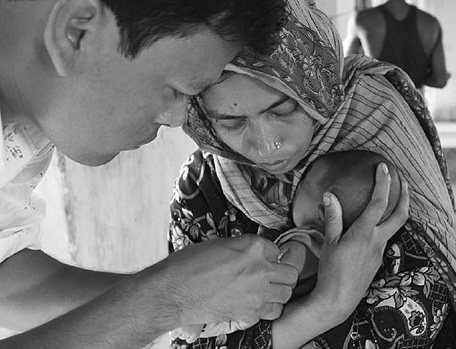
A baby is vaccinated for tuberculosis (BCG) in Bangladesh (Photo: Kana Matsukawa)
In June 2011, at the milestone 10th anniversary of the United Nations Special Session on HIV/AIDS, the United Nations High-level Meeting on HIV/AIDS was held at the UN Headquarters in New York to discuss the current issued on HIV/AIDS and the progress of the countermeasures worldwide. State Secretary for Foreign Affairs Yutaka Banno headed a delegation from Japan, and renewed the government's commitment to contribute to international measures against HIV/AIDS, regardless of the fact that it was soon after the Great East Japan Earthquake. In addition, Japan also contributed in the aspects of expertise in launching the Global Plan towards the Elimination of New HIV Infections among Children by 2015 and keeping their Mothers Alive.
As HIV/AIDS countermeasures through bilateral aid, to prevent new infections Japan spreads knowledge, raises awareness, and provides testing and counseling, and enhance the distribution of drugs to treat HIV/AIDS. In particular, mainly in Africa, JOCV (JICA Volunteers) on HIV/AIDS Control are vigorously engaged in the spread of knowledge and understanding of prevention, and in the care and support of infected persons and patients.
About tuberculosis, under the Global Plan to Stop TB 2006-2015, Japan assists in the implementation of a series of measures against tuberculosis such as the prevention of infection, early detection, diagnosis, and continuous treatment to the countries prioritizing for the prevention of tuberculosis that the World Health Organization (WHO) has designated and the countries with high prevalence of tuberculosis, Japan also promotes measures against co-infection of HIV/AIDS and tuberculosis. In July 2008, the Ministry of Foreign Affairs and the Ministry of Health, Labor and Welfare announced the "Stop TB Japan Action Plan" that was drawn up jointly with JICA, the Japan Anti-Tuberculosis Association, and the Stop TB Partnership Japan. Japan would utilize the experience and technology it had fostered through tuberculosis countermeasures domestically, and in collaboration between the public and private sectors, work to reduce the number of deaths from tuberculosis by 10% (160,000 people, based on 2006 figures) worldwide, by focusing efforts on reducing such deaths in developing countries, particularly in Asia and Africa.
Japan assists in efforts to implement measures against malaria, a major cause of infant mortality, by strengthening local communities and through cooperation with the United Nations Children's Fund (UNICEF).
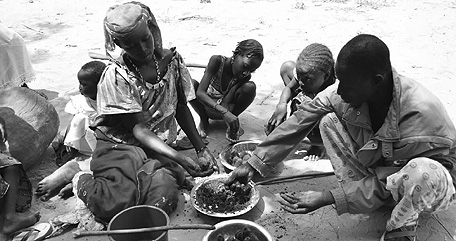
Using neem leaves to make mosquito repellant incense as a measure against malaria, under the guidance of a Japan Overseas Cooperation Volunteer in Niger (Photo: Seico Tamai)
•Influenza
Japan's international cooperation on avian and pandemic influenza has so far reached approximately $400 million (as of April 2011) since 2005.. In addition to providing approximately ¥1.1 billion in emergency grant aid to WHO in September 2009 to support the provision of vaccines in developing countries, Japan provided courses of anti-viral medicine and other supplies for 1.5 million people in Asia in cooperation with the Association of Southeast Asian Nations (ASEAN) and the Asia-Europe Meeting (ASEM) in preparation for new strains of influenza that may be generated in the future. Further, Japan contributes proactively to the international community by providing bilateral aid to strengthen systems to monitor circumstances when there has been an outbreak of influenza and to increase vaccine production capacity, etc. Japan also promotes efforts to build a cooperative framework in the Asia-Pacific region through the World Organization for Animal Health (OIE) to implement measures against highly pathogenic avian influenza and to strengthen surveillance of diseases of wild birds, as countermeasures for the spread of the disease among birds (domestic fowl) that are kept as farm animals.
•Polio
Polio is in the final stages of eradication. Japan provides support, mainly through UNICEF, to provide polio vaccines and other related aid chiefly to the polio-endemic countries (countries in which polio has never been eradicated), Nigeria, Afghanistan, and Pakistan. In April 2009 Japan disbursed $200,000 through UNICEF for polio vaccines to combat the urgent major outbreak of polio in Tajikistan and surrounding countries. Further, Japan has partnered with the private sector's Gates Foundation to utilize ODA loans to provide polio vaccines for approximately 32 million children under the age of five in Pakistan for supporting to eradicate polio (see page 28 for details regarding cooperation with the Gates Foundation).
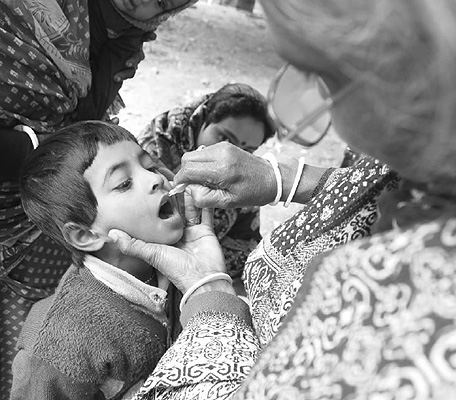
A child is vaccinated for polio in Bangladesh (Photo: Daisaku Miyake)
•Neglected Tropical Diseases
Japan has taken the lead in engaging in full-scale measures against Chagas' disease in Central America, and contributes to decreasing the risk of infection by supporting the establishment of systems to implement measures against insects that transmit the disease. In regard to Filariasis, Japan supplies antiparasitic agents as well as educational materials to provide knowledge and understanding to a large number of people. Japan also conducts preventive education through JOCV in order to reduce the number of new patients and maintain the non-epidemic status.
•Vaccinations
It has been proven that vaccinations are an inexpensive and effective method of combating infectious diseases, and it is estimated that 2 to 3 million lives could be saved each year with vaccination.(Note 13) In 2011, Japan made its first contribution of $9.3 million to the GAVI Alliance (Note 14) (see "Terminology" on page 33), which was established in 2000 to improve the vaccination rate in developing countries. It has been estimated that assistance through GAVI had saved 5.82 million lives by 2010, and that it would be able to save 4.2 million more lives by 2015, the deadline for achievement of the MDGs.
Terminology
*Emerging/reemerging infectious diseases
Emerging diseases: SARS (severe acute respiratory syndrome), avian influenza, the Ebola virus, and other infectious diseases that were not known in the past but that have been newly recognized in recent years. Reemerging diseases: Cholera, tuberculosis, and other infectious diseases that had spread widely in the past, then subsequently saw a decrease in the number of patients and were believed to have converged, but that have increased again in recent years.
*Neglected tropical diseases
Chagas' disease, dengue fever, filariasis, and other diseases transmitted from parasites, bacteria, etc. The number of infected individuals has reached approximately 1 billion worldwide, with some cases resulting in death, although many of the diseases could be prevented or eradicated. In addition, because of factors such as the prevalence among the poor, there is little public concern, so the development and spread of diagnostic methods, treatment, and new drugs is lagging.
Notes:
(12) Source: "10 facts on neglected tropical diseases" http://www.who.int/features/factfiles/neglected_tropical_diseases/en/index.html
 (WHO)
(WHO)
(13) Source: "Health Topics Immunization" http://www.who.int/topics/immunization/en
 (WHO)
(WHO)
(14) The Global Alliance for Vaccines and Immunisation See "Terminology" on page 33.
[Philippines]
"Projects for Prevention and Control of Leptospirosis in the Philippines"
Technical Cooperation Project (April 2010 - Current)
Leptospirosis is a widely-spread infectious disease mainly in tropical and subtropical areas, which causes hepatic disorders, renal failure, pulmonary hemorrhage, and other disorders in an infected individual, and death in some cases. It is estimated that about 500,000 people are infected with this disease worldwide each year, with 23% of those cases ending in death (WHO, 1999). Because the symptoms are very similar to those of other infectious diseases, its prevention and diagnosis requires sophisticated and specialized technology. Leptospirosis is endemic in the Philippines as well. When the nation was struck by a typhoon in October 2009, there was an outbreak of the disease in the affected area, resulting in a large number of deaths. Because of the difficulty of prevention and diagnosis, effective countermeasures have not been taken. In this context, Japan has actively provided assistance for epidemiological studies in relation with Leptospirosis, as well as the development of techniques for rapid diagnosis, etc., through a framework of Science and Technology Research Partnership for Sustainable Development, which is to support joint research between research institutes in Japan and recipient countries.
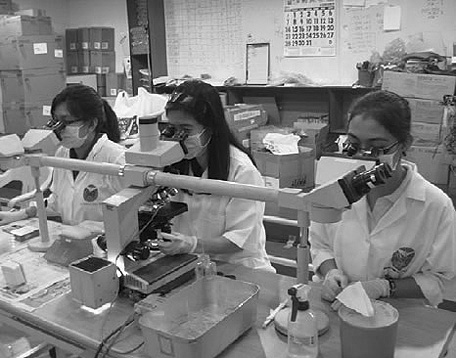
Researchers engage in detection work (Photo: JICA)
[Thailand]
"International Training Course on STIs Case Management Skills"
Third-country Training (October 2008 - March 2011)
Gonorrhea, syphilis, HIV/AIDS, and other sexually transmitted infections create approximately 340 million new patients each year. This is a serious global public health issue, but the current situation is that there is no effective countermeasure in many developing countries because there is a risk of being infected again when individuals stop taking medication believing they have been cured.
Under the cooperation between Japan and Thailand, inviting trainees from five African countries (Botswana, Kenya, Tanzania, Uganda, and Zimbabwe), this project conducts practical training on medical case control techniques, including not only diagnosing and treating patients but also counseling and educating people, and advising how to deal with a partner infected by a sexually transmitted disease, etc. As advocated at the Fourth Tokyo International Conference on African Development (TICAD-IV) held in Yokohama in 2008, Japan is working toward solving global issues by sharing successful experiences in assisting Asia with the countries of Africa.
* STIs: Sexually Transmitted Infections
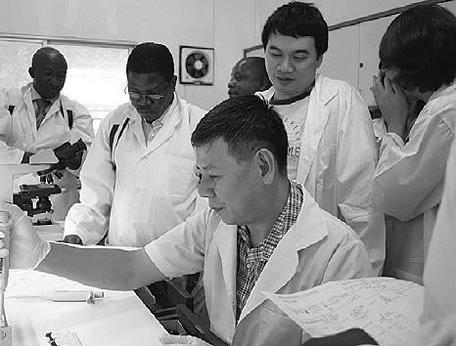
An instructor from Thailand teaches African trainees methods of detecting sexually transmitted infections (Photo: JICA)
